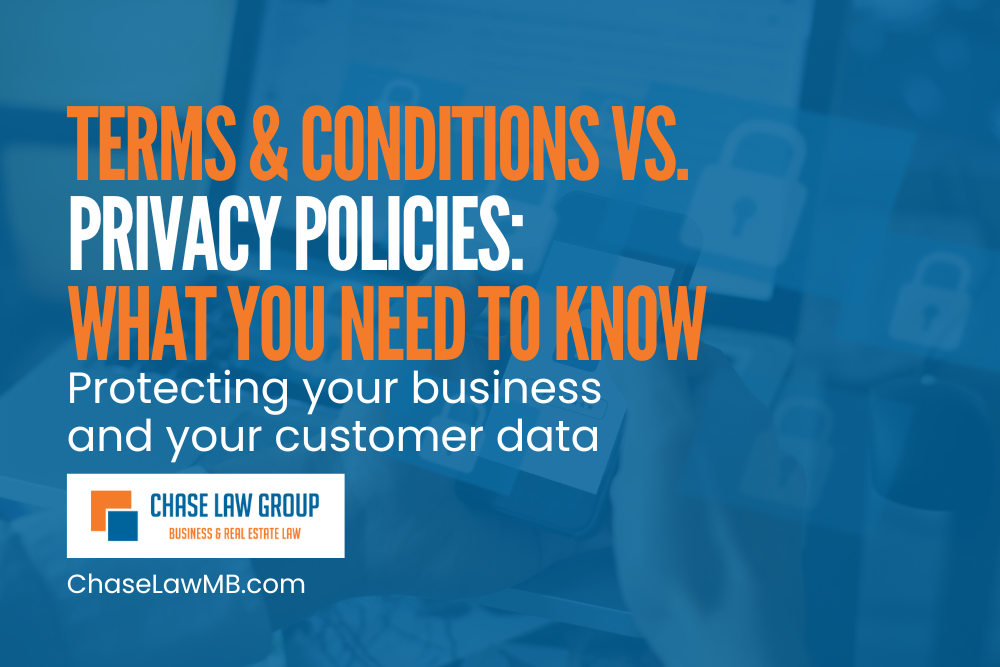Terms & Conditions vs. Privacy Policies: What you need to know
By Admin October 30, 2023 Category: Business Law Tags: business risk management Cal OPPA california business law chase law group chase law manhattan beach Consumer Protection Data Protection data security deanna chase Digital Transparency GDPR Compliance Internet Privacy Legal Compliance legal obligations Legal Requirements los angeles Online Privacy Online Security Privacy Law Privacy Policies privacy rights Small Businesses User Privacy

Online interactions are the norm for anyone doing business today. As businesses use websites and mobile apps to connect with their audience, there are certain responsibilities that businesses have to follow not only as required by law but to ensure a positive relationship with customers. Two key areas: Privacy Policies and Terms & Conditions – often get confused, but both serve distinct roles with different focuses. Let’s explore the differences and why both are essential, especially in the context of laws that may apply.
What is the Purpose of a Privacy Policy?
A Privacy Policy functions as a detailed disclosure of your intended use of any personal data gathered through your mobile app or website. This policy is also known as a privacy statement or privacy notice. The primary purpose is to serve as a legally binding agreement designed to safeguard the interests of both your business and the individuals who provide their personal information.
A Privacy Policy primarily addresses how a business collects, uses, and protects user data. It outlines data collection practices, usage purposes, and data security measures; building trust with users. A strong privacy policy will also explain user rights regarding their data as well as compliance or alignment with any relevant data protection laws like GDPR or CalOPPA.
Privacy laws are continually evolving and have become more stringent. You must comply with the laws that apply to your users’ location. For example, the United States has laws like COPPA and HIPAA, while California enforces the California Consumer Privacy Act (CCPA). In Europe, the General Data Protection Regulation (GDPR) applies. Compliance with these laws is not an option; it’s a legal requirement.
Many third-party apps and services like Google and Apple software require businesses to have a Privacy Policy to ensure a protected experience from the vendors to the end users. Complying with these requirements is essential since analytics tools are reliant upon personal information.
A transparent Privacy Policy is also essential to build trust with users. Reassuring them about data security can turn satisfied customers into brand ambassadors. It’s the right thing to do in today’s data-driven world.
What is the Purpose of Terms & Conditions?
Terms & Conditions define the user-business relationship, establishing rules for website or app use. They set expectations for user behavior, dispute resolution, and liability. Therefore, it is important that the Terms & Conditions include how users agree to abide by the terms, user responsibilities, procedures for handling disputes, limitation of liability, especially in cases of service interruptions or any damages caused by interruption, and the conditions for user access termination.
The Importance of Both Documents
Privacy Policies and Terms & Conditions serve distinct roles and are essential for businesses. A Privacy Policy ensures legal compliance, builds trust through data transparency, and is often required by laws like CalOPPA in California. Terms & Conditions protect the business by defining the user-business relationship and the rules for service use, establishing a digital contract with your website/app users.
Having both is essential for legal compliance and in building trust with your users or customers. They offer legal protection, transparency, and a framework for a positive user experience, ensuring your business operates with integrity in the digital realm.
To help protect your business and users, it’s essential to draft a comprehensive and easily understandable privacy policy that reflects your commitment to responsible data handling and user privacy, and adhere to applicable laws. Contact Chase Law Group to set up a consultation today or call 310.545.7700.
Are your Privacy Policies and Terms & Conditions working for your business and customers? Contact Chase Law Group today
www.chaselawmb.com
Please note that this article is for informational purposes only and should not be considered legal advice. It is recommended to consult with an attorney for specific legal guidance pertaining to your business and its practices.

